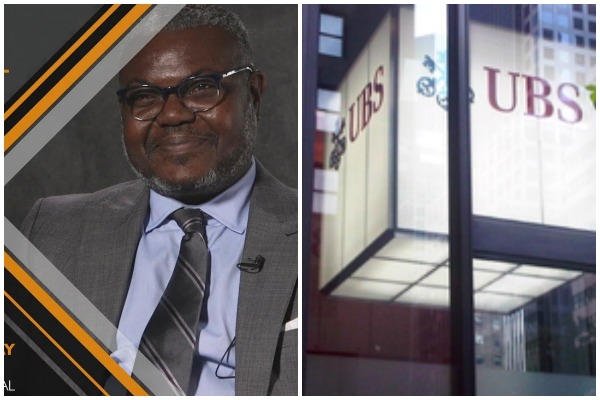UBS, a major player in the world’s financial markets, recently joined forces with a Black-owned investment firm.
And owners of that company, Madison Street Capital, see it as an opportunity to provide more opportunities for wealth building in minority communities.
“We like to say that as a firm, we bring Wall Street quality services to Main Street businesses,” Madison Street Capital CEO Charles Botchway told Atlanta Black Star.

“I think ultimately, it’s going to lead to growth. How significant I don’t know yet, but the potential is immense. And that growth could be very significant. And if that happens as anticipated, well obviously, it gives us better resources to service underserved communities.”
UBS was founded in Switzerland in 1862. Today the company manages the wealth of half the world’s billionaires. In fact, the multinational investment bank is the largest global wealth manager with just shy of $4.2 trillion in invested assets.
UBS is part of the “bulge bracket,” a list of the world’s largest investment banks. It generally does business with large corporations and financial institutions across the globe. According to Leora Zach, one of UBS’ Manhattan executives, the large multinational only does business with companies valued at $200 million or more.
But the company partners with 25 different boutique investment firms that serve clients who fall short of that threshold. UBS recommends those clients to its partner firms and gets a 20 percent referral fee anytime the companies contract with their partners.
Late last year, UBS formed a partnership with Madison Street Capital, a Chicago-based mergers and acquisitions firm that specializes in raising capital for small- to middle-market businesses on the upswing.
“As entrepreneurs who use the wealth management side of UBS decide they either want to sell their businesses or they want to raise capital to expand their businesses, they usually turn to their financial advisors who they trust,” Botchway said.
It was the first time that UBS has partnered with a Black-owned company in the Swiss company’s nearly 160-year history. Zach told Atlanta Black Star that UBS made a conscious effort to “take a hard look” at diversity in its hiring practices and partnerships amid last year’s global outcry for racial equality. The company sought to add more female bankers, support LGBTQ initiatives and expand its global coalition to people from all backgrounds.
Madison Street Capital is an investment firm that operates in the lower-to-middle market. It focuses on businesses valued at $10 million to $500 million.
“A lot of boutiques, a lot of banks tend to focus higher. But for Madison Street, they were excited about being introduced to those $10 million companies. So for us, that really broadened our platform a lot,” Zach said.
“In addition to them having a strong skill set and having our coverage aligned, they bring an important angle of diversity to our platform, which we want to continue to grow and focus on as we add new partners,” she added.
Negotiations began in October. UBS spent two months vetting Madison Street, putting the company through a rigorous due diligence process that included several meetings and interviews. The partnership was finalized in late December.
“The key for us are partners that will do well by our clients. So ensuring that they have the right caliber of skills to execute business is critical,” Zach explained. “We also encourage and look for partners that will reciprocate and refer us business.”
The partnership between the two companies was sparked by a shared passion for service. Botchway credited Jonathan Hodge and Mark Wilkins, two UBS executives in wealth management, with introducing Madison Street to UBS’ team in New York City. It came after conversations between the three about expanding opportunities for wealth creation in African-American and other underserved communities. That aligned with Botchway’s mission at Madison Street.
“There really had always been a conversation about how can we can we work together,” Hodge said. “I think as a community, we can do a better job. And this is an example of how we can. I feel like a lot of times when we’re in these institutions, we keep our head down. My mom raised me to say, ‘You deserve to be in the room, but be quiet when you get there.’ But that serves its purpose up to a point in time, and I’m over that.”
Both Hodge and Wilkins are part of a new generation at UBS that’s leading the push to add more diversity to the multinational’s portfolio. But the synergy between the two companies was truly born from Hodge’s relationship with Walter Whitehead, one of Madison Street’s leading financial advisors.
Hodge said and Whitehead were friends and colleagues who often cross referenced business to one another. They have also both spent years brainstorming ways to build wealth in the Black community. Hodge saw the prospect of adding Madison Street to the UBS platform as a natural progression of their personal and professional relationship
“It feels good that things can be done, even if they’re incremental steps,” Hodge said. “But for me, it’s not about just getting a box checked. Now that Madison [Street’s] on the platform, let’s go out and get business. It’s a win, but that’s that’s not enough. The reason we’re here is to go out and get business. Because the way we really win is when we create opportunities and business for each other.”
Botchway envisioned a one-stop mergers-and-acquisitions shop for small- to medium-sized businesses when he founded Madison Street Capital in 2010. He saw it as a resourced investment firm that could help those businesses sell their companies or raise money to grow them to the next level.
“There’s a real need in that lower middle market. Those folks are not big enough to attract the attention of Wall Street banks,” he said.
“If you look in your backyard, I’m sure they’re tons and tons of bubbling entrepreneurs building businesses who are just getting to that $5- $10- $15 million space where it feels like they’ve got good momentum. It feels like they’ve got good success and if they could just get their hands on another $5 million or $10 million dollars, they could conquer the world.”
Many investment firms shun the lower and middle markets because they do the same amount of work but reap a much larger payoff for brokering $200 million business deals as opposed to a $50 million merger. Botchway acknowledged that reality but feels he has the biggest impact helping mid-level companies, which make up the largest sector of the U.S. economy.
“It’s actually what makes America work, and it’s what separates America’s economy from every other economy,” he said. “That lower end of the middle market employs more people than any other sector of the economy. Most of the businesses are in that space, yet it gets the least attention.”
A Ghanaian native, Botchway said he always strived to position himself to make an impact both in Black communities in the U.S. as well as back in his homeland. He divides his time working with colleagues in West Africa trying to improve conditions there and bolstering Madison Street’s efforts in the U.S.
Madison Street Capital has an office in Ghana that employs young professionals with high-paying jobs and helps businesses there find capital for expansion to create generational wealth.
Botchway said helping those businesses has a trickle down effect that means better wages and more quality employment for locals in the community.
“There’s a mushrooming effect that is comforting,” he said. “And the more of that you can do, obviously, the bigger that effect is.”


